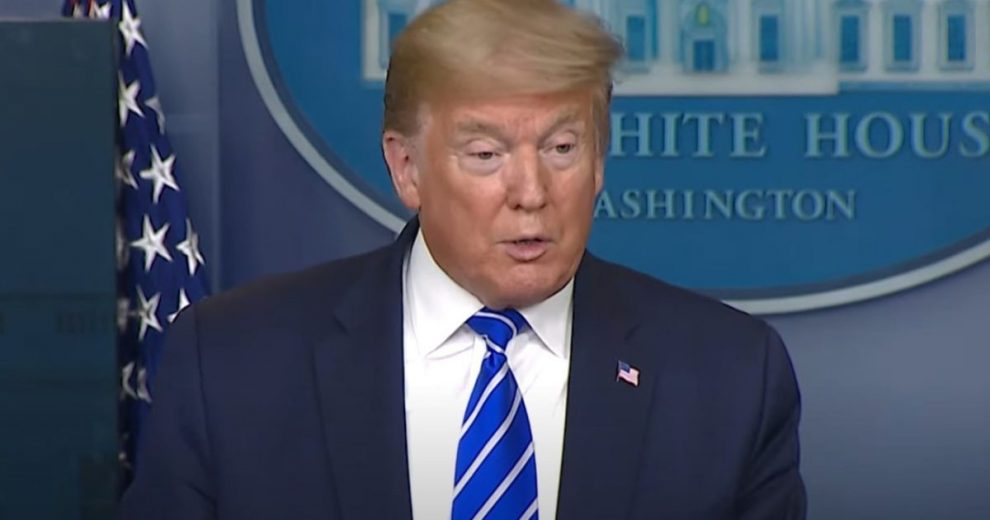Two recent New York Times stories raise the question of whether the paper any longer makes a distinction between news and opinion when it comes to covering Donald Trump. One piece, identified as a “political memo,” makes the case that the president is not nearly as smart as he thinks he is, while the other, presented as a content analysis of Trump’s comments during COVID-19 briefings, argues that he indulges in unprecedented self-praise, self-pity, and blame shifting.
Those portrayals will strike Trump’s critics, presumably including most Times readers, as essentially accurate. But they do not belong in the news section unless the Times has abandoned any pretense that its reporting, as distinct from its opinion section, aspires to even-handedness and political neutrality. While the reality has always been quite different, the paper’s bias in its news coverage has never been more blatant.
Under the headline “Trump’s Disinfectant Remark Raises a Question About the ‘Very Stable Genius,'” national political reporter Matt Flegenheimer mocks the president’s perceptions of his own intelligence and intellectual seriousness. “The president has often said he is exceptionally smart,” the subhead says. “His recent suggestion about injecting disinfectants was not.” Referring to last Thursday’s coronavirus briefing, during which Trump suggested that injections of disinfectants such as bleach and isopropyl alcohol might prove to be effective treatments for COVID-19, Flegenheimer observes: “Mr. Trump’s performance that evening…did not sound like the work of a doctor, a genius, or a person with a good you-know-what.”
Watch: Patriots Player Helps Take Down Field Invader in Moment Not Seen During Broadcast
Ghislaine Maxwell pleads Fifth Amendment, dodges questions in House Oversight Epstein probe
GOP accelerates Trump judge confirmations as pressure builds to kill Senate blue slip
Turning Point USA’s Alternative Halftime Show Draws Huge Numbers
Nancy Guthrie’s church prays God would ‘guide the authorities’ in search
US forces hunt down and board tanker ship defying Trump admin quarantine
Hochul running mate voted to allow noncitizen voting in NYC elections
Bogus businesses and ‘lax’ oversight: How hospice fraud has flourished in California
Bad Bunny’s halftime show ripped for suspected political message and more top headlines
The 2028 Democratic presidential contender must-have accessory: a tell-all book
Trump defends Minneapolis federal enforcement, says crime plunged after ‘thousands of criminals’ removed
Far-left group with foreign ties undermining US under guise of protest, report warns
SCOOP: Trump ally Kid Rock jumps into key governor’s race with high-profile endorsement
The world’s top nuclear powers have no arsenal limits, here are the countries with nukes
Affirmative Action Quotas in Question as Female, Minority Pilots Caused Half of Pilot-Error Crashes
Flegenheimer suggests that Trump’s disinfectant comments could hurt him even among die-hard supporters: “Mr. Trump’s typical name-calling can be recast to receptive audiences as mere ‘counterpunching.’ His impeachment was explained away as the dastardly opus of overreaching Democrats. It is more difficult to insist that the man floating disinfectant injection knows what he’s doing.” Although the piece quotes various observers (all critical of Trump) regarding the episode and its potential political ramifications, there is no mistaking the author’s opinion of the president’s intelligence.
In a story headlined “260,000 Words, Full of Self-Praise, From Trump on the Virus,” Washington correspondents Jeremy Peters and Maggie Haberman, together with national political reporter Elaina Plott, summarize their transcript analysis this way: “The self-regard, the credit-taking, the audacious rewriting of recent history to cast himself as the hero of the pandemic rather than the president who was slow to respond: Such have been the defining features of Mr. Trump’s use of the bully pulpit during the coronavirus outbreak….The transcripts show striking patterns and repetitions in the messages he has conveyed, revealing a display of presidential hubris and self-pity unlike anything historians say they have seen before.”
Peters, Plott, and Haberman are ostensibly presenting data, counting “roughly 600” instances of “self-congratulation,” “more than 260” examples of giving credit to others, “more than 110” examples of blaming others, and “about 160” expressions of empathy. They also quote sources (again, all critics of Trump) who offer their own views. But the authors are unmistakably communicating their low regard for the president in a way that might make the piece an interesting addition to the opinion section but is hardly consistent with straight reporting or even news “analysis.”
Watch: Patriots Player Helps Take Down Field Invader in Moment Not Seen During Broadcast
Ghislaine Maxwell pleads Fifth Amendment, dodges questions in House Oversight Epstein probe
GOP accelerates Trump judge confirmations as pressure builds to kill Senate blue slip
Turning Point USA’s Alternative Halftime Show Draws Huge Numbers
Nancy Guthrie’s church prays God would ‘guide the authorities’ in search
US forces hunt down and board tanker ship defying Trump admin quarantine
Hochul running mate voted to allow noncitizen voting in NYC elections
Bogus businesses and ‘lax’ oversight: How hospice fraud has flourished in California
Bad Bunny’s halftime show ripped for suspected political message and more top headlines
The 2028 Democratic presidential contender must-have accessory: a tell-all book
Trump defends Minneapolis federal enforcement, says crime plunged after ‘thousands of criminals’ removed
Far-left group with foreign ties undermining US under guise of protest, report warns
SCOOP: Trump ally Kid Rock jumps into key governor’s race with high-profile endorsement
The world’s top nuclear powers have no arsenal limits, here are the countries with nukes
Affirmative Action Quotas in Question as Female, Minority Pilots Caused Half of Pilot-Error Crashes
Trump has always viewed outlets like the Times as overtly hostile to him, and stories like these only confirm that impression. The articles dress up opinion as reporting, drawing conclusions that may be perfectly defensible but rely on value judgments and character assessments that readers would ordinarily expect from commentators rather than reporters. While the president’s attacks on the news media are frequently unhinged and overbroad, “reporting” like this validates his thesis that much of the press corps is out to get him.
There is a difference between reporting facts that make Trump uncomfortable, or reporting the opinions of Trump critics, and calling him stupid, uninformed, vain, petty, irresponsible, and self-obsessed. By crossing that line, the Times is erasing the distinction between reporting and advocacy.
Maybe that’s for the best. There is nothing wrong with advocacy or opinion journalism (I do it all the time!), as long as it is intellectually honest and explicitly identified as such. The subtler forms of bias that were apparent in news coverage by the Times long before Trump was elected—manifested in decisions about which facts to include or omit, which sources to quote, and which angles to emphasize—are more insidious and therefore more misleading.
Readers may be better served by a newspaper that is open about its prejudices and does not pretend that it aspires to anything like objectivity, which was always an impossible standard to meet, or even balance. But if that is the route the Times chooses, it must abandon the notion that what it does is fundamentally different from what Fox News does, and its “reporters” can hardly object when Trump publicly describes them as political opponents.
Story cited here.
























